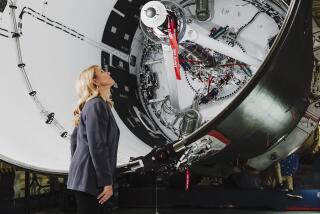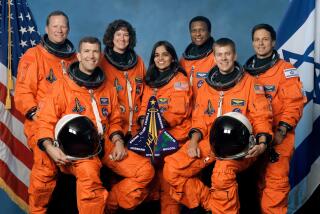Punishing the Whistle-Blowers
- Share via
Some of the most important testimony heard by the commission investigating the space shuttle accident came from two engineers at Morton Thiokol Inc., which built the solid-fuel booster rockets that have been identified as the cause of the disaster. The two engineers, Allan J. McDonald and Roger M. Boisjoly, told the commission that the joints connecting the segments of the booster rockets had been a continuing source of trouble for several years but that the space agency had continued to launch the shuttles despite evidence that the seals became damaged in flight.
They also described to the commission how the company’s engineers had unanimously opposed the launching of the Challenger after learning about cold temperatures at the Kennedy Space Center in Florida the night before the launch. After they were overruled by company managers, Challenger was launched on Jan. 28 and exploded about a minute later, killing all seven crew members.
In further testimony before the commission, which was released over the weekend, McDonald and Boisjoly charged that as a result of their initial appearances, they had been demoted. They said they had been transfered to new jobs in which they had less authority and smaller staffs and were not allowed to examine information about the Challenger accident.
Until his testimony, McDonald had been in charge of Thiokol’s solid-rocket-motor project, a job in which many people had worked for him.After he testified, he was named to the new job of director of special projects, in which he shares a staff with other people. Boisjoly told the commission that he had been “put on the sideline” because of his testimony.
Thiokol executives deny that either man was punished for giving information to the commission, calling the changes part of a company reorganization. These protestations are hard to believe. It is much more likely that the Morton Thiokol bureaucracy works like most bureaucracies do, valuing loyalty over truthfulness even where matters of the highest national concern are at stake.
The chairman of the accident commission, William P. Rogers, concluded that McDonald and Boisjoly had been “punished for being right.” In this, Rogers showed the same perspicacity that he has demonstrated throughout the commission’s work. He was the first to conclude that NASA’s decision-making was “flawed,” and he has held the space agency’s feet to the fire since.
On Monday, James C. Fletcher, who was the head of NASA while the space shuttle was being developed and billions of dollars were wasted, was sworn in for a second tour as the agency’s administrator. For his work, he received a pat on the back. But McDonald and Boisjoly, who are among the few heroes of this unhappy episode, have been punished for their efforts. The outcomes should have been reversed.
More to Read
Sign up for Essential California
The most important California stories and recommendations in your inbox every morning.
You may occasionally receive promotional content from the Los Angeles Times.













